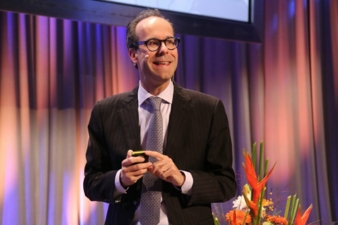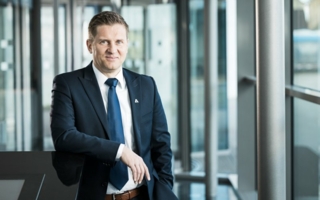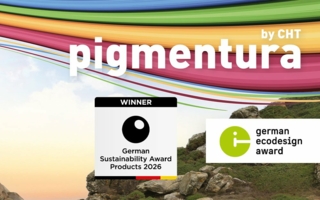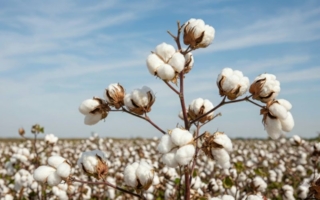18/08/2020 – In times of Corona – interview — auf Deutsch lesen
RWTH Aachen University (ITA): Quo vadis, textile industry?
A solution-oriented discourse! In an interview with textile network, scientists from RWTH Aachen University share their views about the future of our industry.
Our interview partner:
Institut für Textiltechnik of RWTH Aachen University (ITA):
Prof. Dr. Thomas Gries, Director
Daniel Bücher, Team Leader Value Added Management
Thomas Köhler, Programme Manager Biotexfuture
ITA Technologietransfer GmbH (ITA GmbH):
Markus Beckmann, Managing Director
Institute for Technology and Innovation Management at RWTH Aachen University (RWTH TIM):
Prof Dr Frank Piller, Director
Christian Gülpen, Head Digitalization
What kind of impact is the coronavirus crisis having?
Prof Dr Frank Piller (RWTH TIM): We observe three effects in particular: First, of course, a strongly negative and in some cases dramatic sales forecast in many areas. According to a study by the German Chamber of Industry and Commerce (DIHK), 78 percent of companies are expecting slumps of up to 50 percent or more in 2020. This is in particular due to the collapse of orders and a generally lower demand, which in some sectors such as the gastronomy and its suppliers will probably only be “made up for later” to a very limited extent. At the same time, we are seeing strong retrenchments, especially at large companies, even in future-critical areas such as innovation investments. This brings us to the third aspect: The crisis has put the issue of change and new business models back onto the (CEO) agenda. However, successful systematic innovation (i.e. beyond luck and coincidence) also needs the necessary resources. And it is precisely here that many companies (again!) make the mistake of saving in the wrong place.
What impact is it having on the textile industry?
Prof Dr Thomas Gries (ITA): In March and April, the textile industry experienced a slump in orders of more than 30 percent compared to the same period last year. Not only for clothing retailers, but also for clothing manufacturers and the entire supply chain. The crisis has affected everyone. Sales are now slowly picking up again, but we will not make up the deficit. The question now is who can increase production again the fastest and how strong a second wave will be. In total I expect no short-term recovery. The markets and value chains will change more dramatic than in the financial crisis twelve years ago.
What impact is it having on technical textiles?
Markus Beckmann (ITA GmbH): As technical textiles are usually incorporated into capital goods, these are also subject to the dramatic sales forecast mentioned above. Let’s take the example of the automotive industry, where there is currently a decline in orders of around 30 percent, Airbus is currently producing significant parts of its aircraft in stock etc. and nobody can currently predict at what level the markets will settle down after Covid or how long it will take to reach old levels again.
What impact is it having on in-house mechanical engineering?
Markus Beckmann (ITA GmbH): Internal mechanical engineering is by its very nature dependent on the requirements of the goods produced in the food chain and for this reason has also slowed down considerably. This can be observed not only in technical textiles, but also in all mechanical engineering companies related to textile markets – an industry-wide trend. The market volumes in many sectors have therefore become smaller due to lower demand.
It therefore remains to be seen how a recovery will take place. Now it depends on whether the existing situation will be maintained or whether innovations can be developed to expand market shares.
What solutions could there be to the crisis?
Prof Dr Thomas Gries: People are massively unsettled – in terms of health and economic existence. The result: non-essential goods are less in demand as textiles, long-distance travel, cars,... This has a direct and indirect impact on textile production. At the same time, people consider the climatic change to be even more threatening. Production and trade must have credible and positive answers to these fears. “Continuing in the same way” is none. New customer-oriented solutions are required. The answer can only lie in the company-specific combination of bioeconomy and digitisation! Here we are looking for solutions with our partners for our customers.
Can we draw on any historical experience to help us overcome the crisis?
Christian Gülpen (RWTH TIM): A comparison with the last major financial crisis in 2008 is interesting: In this time of global economic tensions, many of the companies that we admire today as digital pioneers and business role models were created: AirBnB, Zalando, Groupon, Uber and others were founded on the often fertile breeding ground of the crisis. Their success is of course not only based on a collapsed financial market. But first of all, the pressure to not only think about a new business idea, but also to implement it, is greater when established markets are threatened. And secondly, sharing platforms such as Uber and Airbnb are particularly attractive when potential customers have to pay more attention to their money (for example, as a result of short-time working) – or are willing to earn some extra money on a platform themselves. However, these developments have been driven mainly by innovative founders, not by the established companies. This is, among other things, due to a lack of willingness to invest or innovation competence, and often also to entrenched structures and organisational inertia. Our advice is therefore to rethink, especially in times of crisis, to allow experiments and to provide money for collaborative future innovations.
Are there any new parameters that might help us deal with the crisis?
Prof Dr Frank Piller (RWTH TIM): The next one to two years will certainly be very exciting. The Corona crisis has shown how important it is for us to make companies and the business ecosystems and logistics networks that link them more resilient for the future. This does not only mean robustness in the sense of physical redundancy – i.e. two production sites instead of one. We must also be able to better anticipate changing environmental conditions, react appropriately and, most importantly, learn from them and make real change. This applies both to “unpredictable” discontinuities such as corona, and to foreseeable change, e.g. towards more sharing, more sustainability, a reflective approach to food etc. Companies that use technologies such as AI and digital platforms to create flexible, agile and resilient business ecosystems and to jointly shape the future in these ecosystems based on fair and sustainable business models will probably be particularly successful. To achieve this, companies must now quickly (but systematically!) think about what such a network could look like for them, then build up the necessary competencies, and trust, and implement them quickly. A great task, which our economy and especially our small and medium-sized businesses can handle excellently together!
The coronavirus has shown how crucial it is to be able to react flexibly to new market conditions. How important is the role of textile research in this context?
Daniel Bücher (ITA): The textile industry is very strongly characterized by medium-sized companies. Research is expensive and involves risks. The situation has shown that the industry needs innovations for survival. Innovations through the digitalization of production, but also through new products and processes will continue to play a role for the industry. Applied research supports companies in meeting these challenges and assumes part of the risks. Research is thus a part of securing innovation in the industry.
The coronavirus has highlighted existing deficits across all sectors. What are the most serious deficits in the textile industry?
Markus Beckmann (ITA GmbH): In mechanical engineering, a central deficit certainly lies in the internationally oriented supply chain, which was abruptly interrupted by the shot down. Alternative suppliers cannot be built from scratch, but are usually the result of strategic sourcing activities. The resilience of individual companies is known to be as good as the weakest link in the chain and will certainly raise some questions in the future whether off shoring is the only strategic means of further crisis protection.
What impact will the coronavirus crisis have on the international textile and apparel industry in general?
Daniel Bücher (ITA): I think the Covid-19 pandemic will further accelerate the existing changes in the industry. The classic business models of clothing retailers have had their day. The examples of the insolvencies of Esprit and Tom Tailor show this quite clearly. Online trade will continue to grow and supply chains will become even more short-lived. But this is also an opportunity for the clothing industry in Europe. The textile industry, on the other hand, will weather the crisis better, even if it is a supplier to the automotive industry. New markets and innovations will emerge from the crisis. All in all, I think that every crisis always offers an opportunity, especially for us in Germany, where the social impact is relatively small.
Will we see more production returning to Europe?
Markus Beckmann (ITA GmbH): A clear yes and no..., because there will be fierce competition for the remaining market volumes soon, which will certainly also cost margins and thus focus product costs, in addition to the above-mentioned resilience. If production in the EU will have a chance, it will only succeed where high labour costs do not play a significant role in the total costs or where other innovative factors like the digitalization of production processes can have a decisive influence.
How do you assess the issue of sustainability in the textile chain – will this be taken much more seriously in future?
Thomas Köhler (ITA): On the one hand, the use of renewable raw materials (such as natural fibres) is an everyday routine for the textile industry. On the other hand, petroleum-based man-made fibres are by far the largest share (2/3) with approx. 80mn tonnes per year.
If you ask the population, a clear majority is in favour of replacing petroleum-based plastics with alternatives made from renewable raw materials. Consumer demands for political intervention are often loudly heard. The willingness to act is much less pronounced.
This is difficult for the textile industry. Anyone who wants to produce sustainable textiles must take a holistic view on the value chain, from raw materials to the final product, which is a challenge. This is why the German Federal Ministry of Education and Research is currently funding the Biotexfuture innovation space. Sustainability in the textile chain will continue to be a serious topic in the future.
Many thanks for the engaging interview!
The questions were asked by Iris Schlomski and ITA on behalf of textile network.





